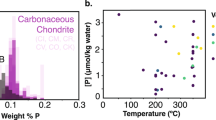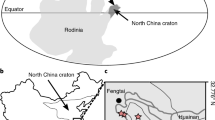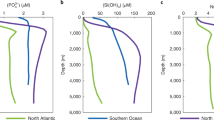Abstract
THERE is little known about the chemical behaviour of the platinum-group metals in the ocean. Here we have used cathodic stripping voltammetry1 to determine the concentration of dissolved platinum in the water column of the Indian Ocean. The range of Pt values obtained (0.2–1.6 pM) is similar to that found previously in the Pacific Ocean2–4. But unlike the earlier Pacific Ocean investigations which depicted platinum as having nutrient-like behaviour, our data show that in the Indian Ocean the element is scavenged down the water column and so is depleted with depth. This is consistent with the predominant oxidation state of platinum in oxygenated sea water being Pt(IV), which is also predicted from thermodynamic considerations and the association of platinum with manganese nodules in sediments2. The data show that platinum co-varies in the water column with dissolved manganese, the concentration of Pt being lower than Mn by a factor of about 600. But the residence time of Pt in the oceans is longer than that of Mn, as revealed by a Pt/Mn ratio in the Indian Ocean that is 300 times higher than in crustal rock.
This is a preview of subscription content, access via your institution
Access options
Subscribe to this journal
Receive 51 print issues and online access
$199.00 per year
only $3.90 per issue
Buy this article
- Purchase on Springer Link
- Instant access to full article PDF
Prices may be subject to local taxes which are calculated during checkout
Similar content being viewed by others
References
van den Berg, C. M. G. & Jacinto, G. S. Analytics chim. Acta 221, 129–139 (1988).
Hodge, V., Stallard, M., Koide, M. & Goldberg, E. D. Earth planet Sci Lett. 72, 158–162 (1985).
Hodge, V., Stallard, M., Koide, M. & Goldberg, E. D. Analyt. Chem. 58, 616–620 (1986).
Goldberg, E. D. Pure appl. Chem. 59, 565–571 (1987).
Elderfield, H. & Bertram, C. J. Report on RRS Charles Darwin Cruise 15/86, Western Indian Ocean (1986).
Morley, N. H. & Statham, P. Adv. underwat tech. Ocean Sci Offshore Eng. 16, 283–289 (1988).
Govett, G. J. S. Handbook of Exploration Geochenistry Vol. 3 (Elsevier, Amsterdam, 1983).
Elding, L. I. Inorg. chim. Acta 6, 647–651 (1972).
Ringbom, A. & Still, E. Analytics chim. Acta 59, 143–146 (1972).
Turner, D. R., Whitfield, M. & Dickson, A. G. Geochin. cosmochim. Acta 45, 855–882 (1981).
Milazzo, G. & Caroli, S. Tables of Standard Electrode Potentials 376–383 (J. Wiley & Sons, Chichester, 1978).
Zika, R. G., Saltzman, E. S. & Cooper, W. J. Mar. Chem. 17, 265–275 (1985).
van den Berg, C. M. G. & Nimmo, M. Sci tot Envir. 60, 185–195 (1987).
Buckley, P. J. M. & van den Berg, C. M. G. Mar. Chem. 19, 281–296 (1986).
Kremling, K., Wenck, A. & Osterroht, C. Mar. Chem 10, 209–219 (1981).
Author information
Authors and Affiliations
Rights and permissions
About this article
Cite this article
Jacinto, G., van den Berg, C. Different behaviour of platinum in the Indian and Pacific Oceans. Nature 338, 332–334 (1989). https://doi.org/10.1038/338332a0
Received:
Accepted:
Issue Date:
DOI: https://doi.org/10.1038/338332a0
This article is cited by
-
Platinum group elements and gold in ferromanganese crusts from Afanasiy-Nikitin seamount, equatorial Indian Ocean: Sources and fractionation
Journal of Earth System Science (2007)
-
The biogeochemical distribution of trace elements in the Indian Ocean
Journal of Earth System Science (1994)
-
Post-depositional mobility of platinum, iridium and rhenium in marine sediments
Nature (1992)
Comments
By submitting a comment you agree to abide by our Terms and Community Guidelines. If you find something abusive or that does not comply with our terms or guidelines please flag it as inappropriate.



